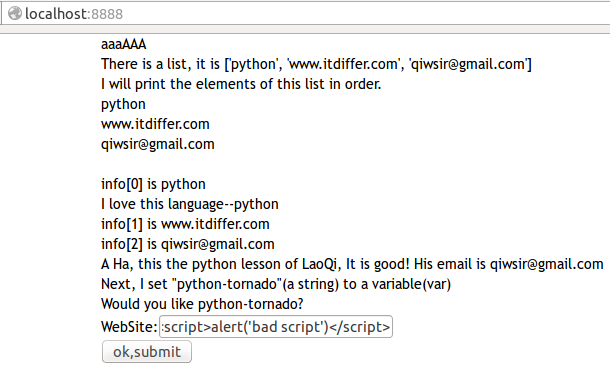"Pay attention to what you hear; the measure you give will be the measure you get, and still more will be given you. For to those who have, more will be given; and from those who have nothing, even what they have will be taken away."(MARK 4:24-25)
列位看官曾记否?在《玩转字符串(1)》中,有专门讲到了有关“转义”问题,就是在python的字符串中,有的符号要想表达其本意,需要在前面加上\符号,例如单引号,如果要在字符串中表现它,必须写成\'单引号里面\'样式,才能实现一对单引号以及里面的内容,否则,它就表示字符串了。
在HTML代码中,也有类似的问题,比如>等,就是代码的一部分,如果直接写,就不会显示在网页里,要向显示,同样需要转义。另外,如果在网页中有表单,总会有别有用心的人向表单中写点包含>等字符的东西,目的就是要攻击你的网站,为了防治邪恶之辈,也需要将用户输入的字符进行转义,转化为字符实体,让它不具有HTML代码的含义。
转义字符串(Escape Sequence)也称字符实体(Character Entity)。在HTML中,定义转义字符串的原因有两个:第一个原因是像“<”和“>”这类符号已经用来表示HTML标签,因此就不能直接当作文本中的符号来使用。为了在HTML文档中使用这些符号,就需要定义它的转义字符串。当解释程序遇到这类字符串时就把它解释为真实的字符。在输入转义字符串时,要严格遵守字母大小写的规则。第二个原因是,有些字符在ASCII字符集中没有定义,因此需要使用转义字符串来表示。
Tornado 2 开始的模板具有自动转义的功能,这让开发者省却了不少事情。看一个例子。就利用上一讲中建立的开发框架。要在首页模板中增加一个表单提交功能。
修改template/index.html文件,内容如下:
<DOCTYPE html>
<html>
<head>
<title>Loop in template</title>
<link rel="stylesheet" type="text/css" href="{{ static_url('css/style.css')}}">
</head>
<body>
<h1>aaaAAA</h1>
<p>There is a list, it is <b>{{info}}</b></p>
<p>I will print the elements of this list in order.</p>
{% for element in info %}
<p>{{element}}</p>
{% end %}
<br>
{% for index,element in enumerate(info) %}
<p>info[{{index}}] is {{element}}
{% if element == "python" %}
<p> <b>I love this language--{{element}}</b></p>
{% end %}
{% end %}
{% if "[email protected]" in info %}
<p><b>A Ha, this the python lesson of LaoQi, It is good! His email is {{info[2]}}</b></p>
{% end %}
<h2>Next, I set "python-tornado"(a string) to a variable(var)</h2>
{% set var="python-tornado" %}
<p>Would you like {{var}}?</p>
<!--增加表单-->
<form method="post" action="/option">
<p>WebSite:<input id="website" name="website" type="text"></p>
<p><input type="submit" value="ok,submit"></p>
</form>
</body>
</html>在增加的表单中,要将内容以post方法提交到"/option",所以,要在url.py中设置路径,并且要建立相应的类。
然后就在handler目录中建立一个新的文件,命名为optform.py,其内容就是一个类,用来接收index.html中post过来的表单内容。
#!/usr/bin/env python
#coding:utf-8
import tornado.web
import sys
reload(sys)
sys.setdefaultencoding('utf-8')
class OptionForm(tornado.web.RequestHandler):
def post(self):
website = self.get_argument("website") #接收名称为'website'的表单内容
self.render("info.html",web=website)为了达到接收表单post到上述类中内容的目的,还需要对url.py进行如下改写:
#!/usr/bin/env python
#coding:utf-8
import sys
reload(sys)
sys.setdefaultencoding('utf-8')
from handler.index import IndexHandler
from handler.optform import OptionForm
url=[
(r'/', IndexHandler),
(r'/option', OptionForm),
]
看官还要注意,我在新建立的optform.py中,当接收到来自表单内容之后,就用另外一个模板info.html显示所接收到的内容。这个文件放在template目录中,代码是:
<DOCTYPE html>
<html>
<head>
<title>Loop in template</title>
<link rel="stylesheet" type="text/css" href="{{ static_url('css/style.css')}}">
</head>
<body>
<h1>My Website is:</h1>
<p>{{web}}</p>
</body>
</html>这样我们就完成表单内容的提交和显示过程。
从上面的流程中,看官是否体验到这个框架的优势了?不用重复敲代码,只需要在框架内的不同地方增加内容,即可完成网站。
演示运行效果:
我在表单中输入了<script>alert('bad script')</script>,这是多么阴险毒辣呀。
然而我们的tornado是不惧怕这种攻击的,因为它的模板自动转义了。当点击按钮提交内容的时候,就将那些阴险的符号实体化,成为转义之后的符号了。于是就这样了:
输入什么,就显示什么,不会因为输入的内容含有阴险毒辣的符号而网站无法正常工作。这就是转义的功劳。
在tornado中,模板实现了自动转义,省却了开发者很多事,但是,事情往往没有十全十美的,这里省事了,一定要在别的地方费事。例如在上面那个info.html文件中,我打算在里面加入我的电子信箱,但是要像下面代码这样,设置一个变量,主要是为了以后修改方便和在其它地方也可以随意使用。
<DOCTYPE html>
<html>
...(省略)
<body>
<h1>My Website is:</h1>
<p>{{web}}</p>
{% set email="<a href='mailto:[email protected]'>Connect to me</a>"%}
<p>{{email}}</p>
</body>
</html>本来希望在页面中出现的是Connect to me,点击它之后,就直接连接到发送电子邮件。结果,由于转义,出现的是下面的显示结果:
实现电子邮件超链接未遂。
这时候,就需要不让模板转义。tornado提供的方法是:
- 在Application函数实例化的时候,设置参数:autoescape=None。这种方法不推荐适应,因为这样就让全站模板都不转意了,看官愿意尝试,不妨进行修改试一试,我这里就不展示了。
- 在每个页面中设置{ % autoescape None % },表示这个页面不转义。也不推荐。理由,自己琢磨。
- 以上都不推荐,我推荐的是:{ % raw email % },想让哪里不转义,就在那里用这种方式,比如要在email超级链接那里不转移,就写成这样好了。于是修改上面的代码,看结果为:
如此,实现了不转义。
以上都实现了模板的转义和不转义。
本来模板转义和不转义问题已经交代清楚了。怎奈上周六一个朋友问了一个问题,那个问题涉及到url转义问题,于是在这里再补上一段,专门谈谈url转义的问题。
有些符号在URL中是不能直接传递的,如果要在URL中传递这些特殊符号,那么就要使用它们的编码了。编码的格式为:%加字符的ASCII码,即一个百分号%,后面跟对应字符的ASCII(16进制)码值。例如 空格的编码值是"%20"。
在python中,如果用utf-8写了一段地址,如何转义成url能够接收的字符呢?
在python中有一个urllib模块:
>>> import urllib
>>> #假设下面的url,是utf-8编码
>>> url_mail='http://www.itdiffer.com/[email protected]'
>>> #转义为url能够接受的
>>> urllib.quote(url_mail)
'http%3A//www.itdiffer.com/email%3F%3Dqiwsir%40gmail.com'
反过来,一个url也能转移为utf-8编码格式,请用urllib.unquote()
下面抄录帮助文档中的内容,供用到的朋友参考:
quote(s, safe='/')
quote('abc def') -> 'abc%20def'
Each part of a URL, e.g. the path info, the query, etc., has a
different set of reserved characters that must be quoted.
RFC 2396 Uniform Resource Identifiers (URI): Generic Syntax lists
the following reserved characters.
reserved = ";" | "/" | "?" | ":" | "@" | "&" | "=" | "+" |
"$" | ","
Each of these characters is reserved in some component of a URL,
but not necessarily in all of them.
By default, the quote function is intended for quoting the path
section of a URL. Thus, it will not encode '/'. This character
is reserved, but in typical usage the quote function is being
called on a path where the existing slash characters are used as
reserved characters.
unquote(s)
unquote('abc%20def') -> 'abc def'.
quote_plus(s, safe='')
Quote the query fragment of a URL; replacing ' ' with '+'
unquote_plus(s)
unquote('%7e/abc+def') -> '~/abc def'
转义是网站开发中要特别注意的地方,不小心或者忘记了,就会纠结。



